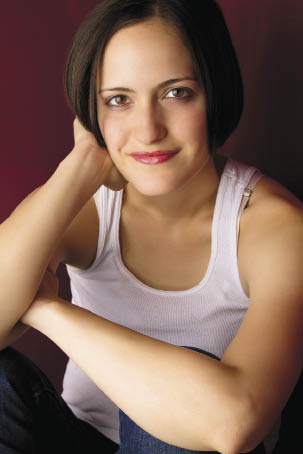When Fernanda Coppel came to the hilly UC Santa Cruz campus, her plan was to become a lawyer. Born in Mazatlan, she grew up in an all-female household in San Diego, working since she was 16 to support herself. The law, she believed, would provide a stable life.
A campus play put on by Don Williams’s Rainbow Theater shattered that carefully laid strategy, however.
Today, the 26-year-old Coppel lives in an apartment in Brooklyn and works two part-time jobs—but she also has a fellowship at the prestigious Juilliard School, and her off-Broadway play, Chimichangas and Zoloft, will soon be staged by the Tony Award–winning Atlantic Theater, which was founded by playwright David Mamet and actor William H. Macy.
“Fernanda Coppel,” said Pulitzer Prize–winning playwright Marsha Norman, who teaches at the famed arts school, “is one of the most electrifying talents we have ever seen at Juilliard.”
Those who know Coppel describe her as humble, charismatic, intelligent, perceptive, and “a girl with a wicked sense of humor.”
In a telephone interview, Coppel admitted to the humor, which lurks in all her plays, but credited her mentors—Norman, Williams, and Emeritus Professor of Theater at UCSC Alma Martinez—for what is considered her nearly lightning-fast success in the world of theater.
It was Williams who first encouraged her, and Martinez who always said, “to be an artist means really studying the craft,” Coppel recounted. “It meant reading the classics and knowing how to construct a play.”
It also meant the intellectual tough love with which Martinez challenged her, something critical to Coppel’s growth.
Coppel, who graduated from Merrill College in 2007 with a literature degree and got her MFA in dramatic writing from New York University, writes from the world around her and from her perspective as a young Latina lesbian.
“I’ll be angry about something or I’ll see or connect with something, and I’ll research and write a story about that,” Coppel says.
Her latest play, Chimichangas and Zoloft, for instance, tells the story of a 40-year-old woman who, fueled by the twin influences of Zoloft and greasy chimichangas, flees her family and sets her teenage daughter and friend on a plan to bring her back. Meanwhile, the girls’ fathers come face
to face with a secret sexuality.
“I was coming out to myself and realizing who I was and that it wasn’t going to change,” Coppel said about writing the play, which won the 2009 Asuncion Queer Latino Festival in New York. She gives a quick laugh. “It wasn’t just a Santa Cruz sort of thing. I was accepting it into my life.”
Other Coppel plays have featured a woman who dresses as a man in order to survive the violent drug cartels that engulf her, and a Ph.D. candidate whose mentor urges her to write her dissertation on her girlfriend’s working-class values—a choice that ends up forcing the student to choose between career and love.
“My whole M.O. is to write more parts for Latina women,” Coppel says, “to be different than what is seen in mainstream theater today.”
“Fernanda is the only writer we know who is writing about young Latin American women facing all the challenges of life in America, made more difficult by gender, sexual identity, and cultural origin,” playwright Norman said.
Peggy Townsend is a freelance writer based in Santa Cruz.



